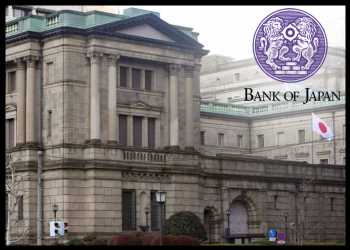Bank Of Japan To Review Side Effects Of Ultra Easing In Next Week's Policy Session: Report

The Bank of Japan is set to review the side-effects of its massive monetary easing during the policy session on January 17 and 18, and may make additional policy adjustments to correct the distortions in the yield curve, the Yomiuri Shimbun newspaper reported Thursday, without citing sources.
In the December monetary policy session, the nine-member board unexpectedly decided to expand the range of the 10-year JGB yield fluctuations to 0.5 percentage points from 0.25 percentage points.
Despite the surprise tweak to the yield curve control, or YCC, last month, the market functioning has improved little.
In the next week’s meeting, policymakers are set to examine if market distortions can be corrected through adjustments in the purchase volume of government bonds, the newspaper reported.
The Yomiuri report also said the bank would raise the forecast for consumer price inflation ex-fresh food to 1.6 percent for fiscal 2023 and to 2 percent or above for fiscal 2024, citing the rising raw material prices for a wide range of goods.
Inflation in Japan’s capital Tokyo hit 4 percent for the first time in four decades at the end of 2022, official data revealed earlier this week, lifting speculation over a shift in the BoJ’s ultra-loose policy stance.
Rising inflation has prompted calls for wage hikes to help the public cope with the consequent climb in the cost of living.
Last week, Japanese Premier Fumio Kishida and BoJ Governor Haruhiko Kuroda urged companies to raise salaries as official data revealed that wages declined at the sharpest pace in 8 years in November.
Fast Retailing, the owner of the Japanese fashion retailer Uniqlo, said on Wednesday that it will raise salaries by 40 percent, a move that could set a trend for the Japan Inc.
The company, which operates over 1,000 stores globally, will raise the employee pay from March 2023.
Bank of Japan’s new chief is widely expected to review the current inflation targets on taking charge in April.
Reports and surveys suggested that the current Deputy Governor Masayoshi Amamiya or his predecessor Hiroshi Nakaso are the front-runners in the race to be at the helm of the Japanese central bank when Kuroda’s term ends on April 8.
Analysts at Daiwa Capital Markets said while there are expectations that the BoJ may adopt a wait-and-watch stance this month, before adjusting the YCC parameters further, that is unlikely to prompt markets to ease up the pressure on the yields anytime soon.
“Indeed, the RBA’s [Reserve Bank of Australia] experience, whereby it left it far too long to bring an end to its own YCC policy, such that its eventual exit was disorderly and damaging for credibility, suggests that the BoJ will appreciate the need not to remain too far behind the curve for too long,” Daiwa Capital Markets analysts said.
“So, next week’s policy meeting seems very much subject to risks of another surprise from Kuroda.”
Source: Read Full Article
